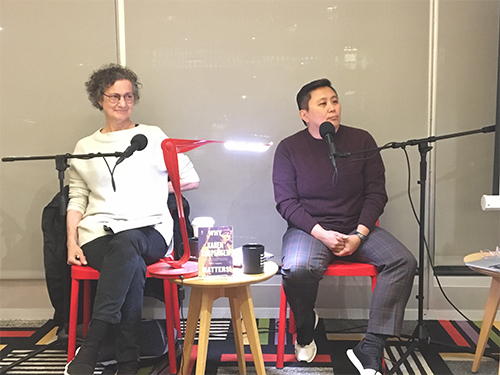
I wanna be around
To pick up the pieces
When somebody breaks your heart
Some somebody twice as smart as I
We sang this song together on the streets of Chicago a few years ago the night they told me they were sick. The words and melody found their way to us in one of those moments of almost forgetting, with the spark that comes when you and someone you adore settle on a shared object—in this case a morbidly appropriate earworm.
Lauren had broken the news to me a couple of hours before. They and Erica Rand invited me to join them for a nightcap, and I dragged my conference roomie Jennifer Doyle along not anticipating the anvil that was about to drop on our heads. When I heard the words come out of their mouth, I thought I was going to vomit. I burst into tears instead. True to form, Lauren began to analyze my emotional response—that toggle between two affective reflexes—in a way that made analysis feel like aftercare instead of probing. Like love instead of judgment.
Years before, during an afternoon spent lollygagging around Berlin (though to be honest, I don’t think Lauren ever truly lollygagged), they met my wife Sarah for the first time and within the first couple of minutes remarked, “You’re a Jewish girl from Philadelphia. Am I right?” I learned that day that their ability to interpret others, to read them (in a non-pejorative sense) stemmed from their childhood among gamblers who enlisted them in picking the right horse, and betting on the right cards. In one of several flurries of texts over these last several months, we dreamt aloud about playing a game of poker together to see who was better at reading people. (Everyone already knows Lauren is the answer.)
It made me feel inordinately lucky, like I was the right horse, when THE Lauren Berlant emailed me out of the blue one day about something I blogged as a first-year assistant professor languishing in anxiety and depression. In the decade and a half since, a sporadic and intense correspondence ensued, punctuated by real life visits in distant cities, and sometimes our own. They even convinced me to go to a vegan place called the Loving Hut in Chicago, though it ended up being closed so we went for Ethiopian food instead. That day they said one of the truest things anyone’s ever uttered about me: “You hate having a bad meal, don’t you? You demand satisfaction.”
They became a mentor when others turned away. In the last five years they also became my editor, and I am absolutely gutted that I still owe them a book for their series, though they always reassured me that my circuitousness was a strength and not a weakness. They told me I could write the way I wanted: “I wonder if you’re more oral sounding than writerly sounding? I feel like you’re in the room when I read you (yay!)”
I could go on. I could write about how in every project I’m working on now, I’m trying my hardest to sing in tune with the brilliance they offered this world about forms, feeling, world-making and the absorptiveness of norms. In recent years they turned me into someone committed to short forms of writing, to “hundreds” here and there, as their work with Kathleen Stewart beautifully animates. But as they wrote to me in May, “One needs to get enough details and then to stop giving details at the moment that you can’t say you’re just describing, but rather transforming.” (600)
